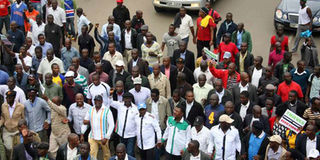Raila calls for dialogue with Uhuru, insists anti-IEBC demos still on

Cord principals Raila Odinga, Kalonzo Musyoka and Moses Wetang'ula join their supporters in a march along University Way on May 9,2016 as they head to Anniversary Towers to demonstrate against IEBC commissioners, whom they want removed from office. PHOTO | EVANS HABIL | NATION MEDIA GROUP
What you need to know:
- Cord leader Raila Odinga says President Kenyatta did not respond to his 2014 letter.
- Instead, Raila says senior Jubilee members took to "flippant and deriding" remarks.
- Mr Odinga said Cord was left with no other option but to use demonstrations to voice their concerns.
Cord leader Raila Odinga has renewed calls for a structured and inclusive national dialogue to discuss challenges facing the country.
In a formal letter to President Uhuru Kenyatta calling for the talks, Mr Odinga revisited the June 20, 2014 invitation to the Head of State to initiate a dialogue with all stakeholders to discuss inclusivity and national unity, electoral reforms, devolution, corruption and insecurity.
“It is about 22 months now since I wrote to you regarding the need for structured national dialogue on various matters of grave national interest that faced this country then,” reads Mr Odinga’s latest letter.
He expressed regret that to date, Mr Kenyatta had not responded to his concerns and that he had instead received “flippant and deriding remarks” from senior members of the Jubilee coalition.
As a result, Cord members have resorted to using demonstrations to voice their concerns, he said.
Mr Odinga noted that the issues he had raised had assumed a “calamitous” dimension over time setting in motion a repeat of Kenya’s tragic history.
“On behalf of the Cord fraternity, I hereby renew this call and restate the commitment of the members of Cord to an orderly and peaceful deliberation on our challenges,” he added.
READY FOR TALKS
Mr Odinga had on Tuesday said Cord was open to talks with the government and all stakeholders including the political class, trade unions and the civil society to primarily discuss ways of reforming the Independent Electoral and Boundaries Commission (IEBC).
However, he maintained that Cord leaders and their supporters would continue holding countrywide protests every Monday to push for the resignation of IEBC commissioners.
The commissioners last week insisted that they would not resign until Mr Odinga showed evidence that they are planning to rig the 2017 election in favour of President Kenyatta.
In his 2014 letter to Mr Kenyatta, the Cord leader had made it clear that he had chosen dialogue as the lawful and sensible way of dealing with problems facing the country.
“There are obvious signs that if we do not confront these problems and challenges now through a structured process of national dialogue then the road to peace will be thorny and difficult,” he had said.
He had also stated that he did not seek any office or reward and neither did Cord want to share power with the Jubilee administration.
“I offer the hand of peace and an olive branch so that we may dwell in unity, peace and liberty and in happiness and prosperity,” he had said.
On inclusivity and national unity, Mr Odinga had warned of a growing trend where most communities were feeling discriminated against in appointments to high offices.
“Less than a year after the last general elections, several communities are feeling excluded on the basis of ethnicity, identity or gender," he said.
On devolution, Mr Odinga said that counties had lost nearly Sh600 billion between 2012 and 2014 because the National Treasury used outdated accounts to share revenue between the two levels of governments.
Mr Odinga also warned that corruption was getting out of hand and called for a national dialogue to discuss ways of containing the vice.
“Major questions are being raised about the probity and accountability of several pork-barrel and ‘sweetheart’ deals in the energy, oil, mining and agricultural sectors. Mega projects have become the handmaiden of grand corruption,” he warned.
Mr Odinga also called for an overhaul of the electoral body to ensure that future elections are credible.
“It is not my wish to contest the results of the presidential elections held in 2013. Rather, I want Kenya to develop a political culture based on the proposition that elections should not be remembered through the repulsive images of disputes and even conflicts that arise after every election but rather by the power and might of the ballot exercised and cast in freely contested democratic election,” he said.





